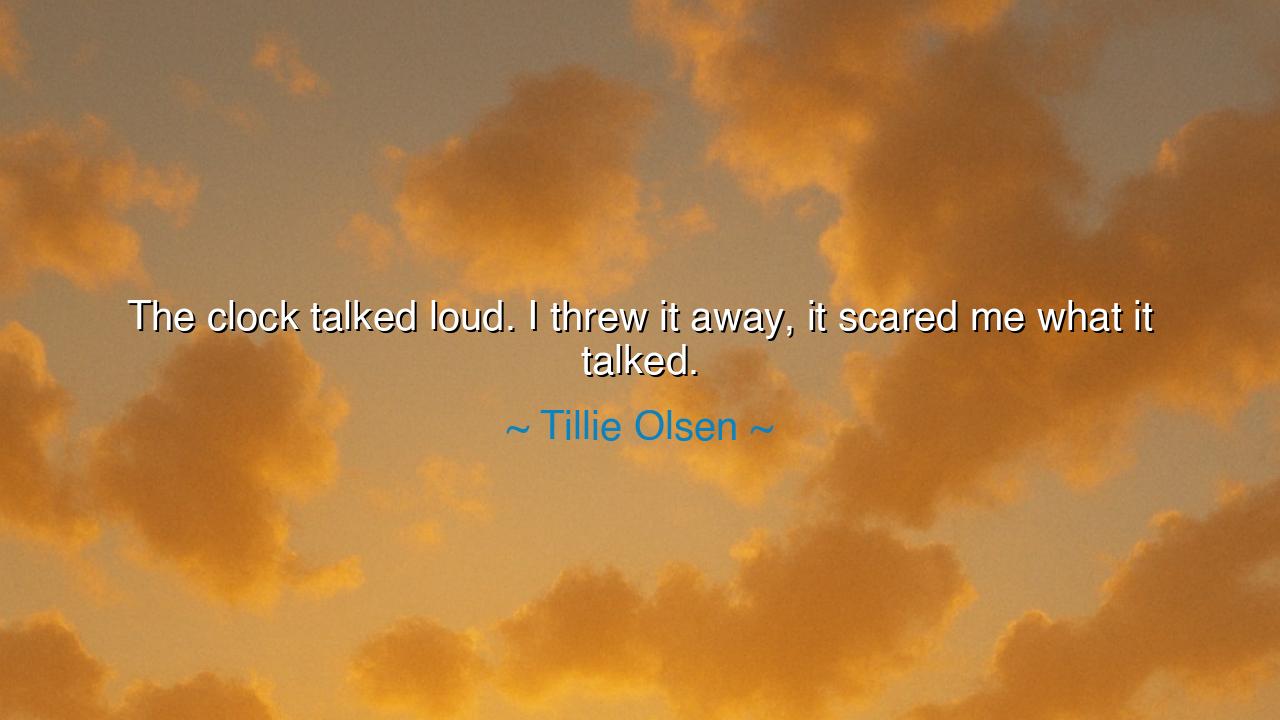
The clock talked loud. I threw it away, it scared me what it






The words of Tillie Olsen—“The clock talked loud. I threw it away, it scared me what it talked.”—are not merely about a timepiece, but about the haunting voice of mortality, of urgency, of life slipping quietly away. The clock is no ordinary object; it is the ancient symbol of time, relentless, unyielding, whispering and shouting in equal measure. When Olsen says she was afraid of what it “talked,” she is naming the fear that lives in every heart: the fear of squandered days, of passing years, of the brevity of our existence.
For the ancients too understood the tyranny of the clock, though they did not number their hours as we do. The Romans spoke of tempus fugit—“time flies.” The Greeks imagined the god Chronos, devouring his own children, to symbolize how time consumes all things. Tillie Olsen, in her quiet lament, joins this long chorus of voices who have felt the weight of passing hours pressing upon their souls. The clock, in its ticking, reminds us not only of appointments and duties, but of our fragility, our impermanence.
Her words carry the deeper meaning of struggle. Olsen was a woman who bore many burdens—work, poverty, motherhood—and longed for more time to write, to give voice to her own soul. In the loud voice of the clock, she did not merely hear seconds slipping away; she heard the demands of survival, the silencing of creativity, the crushing reminder that life’s most precious pursuits can be stolen by necessity. Thus, the clock became her tormentor, speaking too loudly of all she might never accomplish.
History gives us examples of this same dread. Consider Franz Kafka, who labored in bureaucratic obscurity by day and wrestled with his art by night. He knew the ticking of the clock all too well, struggling to carve space for his true work before illness consumed him. Or think of Vincent van Gogh, who in his short years painted as though every brushstroke was a rebellion against the dwindling time he felt in his bones. Both men heard what Olsen heard: the terrifying truth that time is limited, and that to waste it is to lose part of one’s soul.
But there is also hope hidden within her fear. For if the clock terrifies us, it is because it tells the truth: our days are finite, our years precious. And this truth, though heavy, can be a call to courage. To throw away the clock is not to escape time, but to declare that one will not be enslaved by its tyranny. It is to say: I will live as fully as I can, even in the face of mortality, even against the demands of endless ticking.
The lesson, then, is twofold. First, let us not ignore the clock, for it reminds us to treasure each fleeting day. But second, let us not be ruled by it, for a life lived only by the tyranny of schedules and duties is no true life at all. As Marcus Aurelius taught, we must live as if each day were both our first and our last, using the hours not for trivialities but for what nourishes the soul.
Practical action follows naturally. Do not spend your days only chasing obligations while neglecting what brings you meaning. Carve out time for creation, for love, for reflection. When the clock speaks loudly of fear, answer it not with despair but with defiance: use the moments you have for that which endures. Rise early to write the poem, call the friend, paint the canvas, speak the truth. For though you cannot silence the clock, you can choose what song you will sing while it ticks.
Thus, Tillie Olsen’s words pass down to us as both warning and wisdom. The clock speaks, but so can we. Let us not be cowed by its voice, but let us respond with lives that matter—lives that turn the fleeting rhythm of time into music worth remembering.






AAdministratorAdministrator
Welcome, honored guests. Please leave a comment, we will respond soon